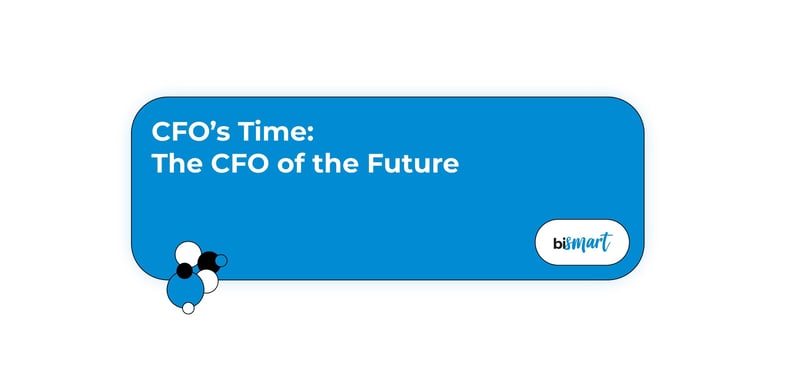We analyze the role of a CFO within a company and explore the new competencies a CFO must have in 2022. Become the CFO of the future!
The role of the CFO is evolving into an increasingly strategic role. Technology skills, strategic vision and a data-centric mindset are some of the core competencies of the new CFO.

If we can take anything good from the global pandemic of 2020 and 2021, it is the disruption of business roles and routines. Covid-19 brought about obvious changes in work patterns, pushing companies towards forced digitization.
Beyond digitization, the pandemic also challenged the financial strategy of many companies. Covid-19 had fatal financial consequences for most organizations. However, founders with a sound financial strategy that included sufficient cash reserves, comprehensive risk management and agile flow management strategies were able to adapt and overcome the adverse conditions.
After the pandemic, many realized the importance of a CFO's role within a company, which goes beyond accounting management. Accountants examine historical business data, complete tax returns and report on what has happened in the company, focusing on regulatory reporting and compliance. CFOs, on the other hand, have a strategic role.
Are you a CFO looking to step up your strategic role and skills? Download our exclusive guide for CFOs: "CFO's Time: The CFO of the future".

The role of the Chief Financial Officer (CFO) in 2022
The role of the Chief Financial Officer is evolving. In today's context, the role of a CFO requires much more than accounting knowledge. Among other things, it is essential for a CFO to have a global technological and strategic vision that includes all levels of a company.
CFOs must expand their traditional competencies and assume their accountability in risk management, forecasting and long-term strategy. CFOs should be in charge of building an integrated roadmap that includes decision making and action development to achieve the company's objectives and proactively influence business decisions.
How? By fulfilling the role that a CFO should really have: providing key information to advise the CEO and transforming that information into strategies for increasing profit margins, boosting sales profit, reducing costs, increasing revenues and managing capital assets; aligning financial objectives with the company's overall objectives.
Simply put, the CFO of 2022 is a critical thinker, a strategist and a producer of financial insights.
Data-driven CFO
Reaffirming the above, a successful CFO is a Chief Financial Officer who is not afraid of technology. On the contrary, they leverage it as a fundamental part of the financial strategy. More importantly, a successful CFO is now a CFO who works with data and has a data-centric mindset.
If we take as a reference the qualities that a CFO must have in 2022 —a critical thinker, a strategist, a producer of financial insights— it is clear that data analysis plays a crucial role in financial strategy.
The constant monitoring of financial metrics is the only way to provide valuable information to the CEO, develop effective strategies, control risk and identify growth opportunities.
On the other hand, a strategic mindset requires an understanding of the current situation in order to develop future strategies and prevention. Long-term strategic decision making is one of the main characteristics that differentiate a successful CFO from an accounting manager.
In short, the CFO of 2022 is a data-driven CFO: he or she works with data, explores it and makes data-driven decisions.
Data visualization for the visualization of the financial strategy roadmap
Indeed, data visualization and reporting play a major role in the development of an effective financial strategy, being the basic tool for the CFO to make informed and intelligent strategic decisions.
Having access to quality data is the first step. After all, the quality of your decisions depends on the quality of your data. However, beyond data quality, it is essential that the data is transformed into narratives that elicit understanding and conclusions, especially considering the strategic —not technical— role of a CFO.
This is where data visualization and its transformation into efficient reports and dashboards make a difference. The value of data visualization in business decision making is undeniable and even more so when it comes to financial decisions.
One of the biggest problems facing CFOs is that finance is complex and difficult to understand. Financial data is the most resistant to being transformed into easy-to-follow narratives and visualizations that elicit conclusions and intelligent decisions.
Precisely because of this, it is common for financial reports to fall somewhere between messy spreadsheets and dashboards, with an excessive amount of poorly labeled graphics that fail to convey any message to recipients.
Converting financial data into actionable information is challenging. However, it is not impossible. According to our expert financial analysts, the ideal financial scorecard should be simple, easy to understand and focused on KPIs.
Wrapping up
Today's CFOs play a strategic role within the company and must have competencies that go far beyond accounting management.
The role of what we have allowed ourselves to call "Next Generation CFO" is to contribute to decision making and the construction of financial strategies linked to the company's overall long-term objectives.
To this end, the 2022 CFO must have:
- Strategic mindset: A strategic CFO understands that tomorrow's success depends on creating the right financial structure today. The CFO must work together with the CEO to create a viable financial plan that will carry the company through future stages of growth.
- Data-driven mindset: To carry out an effective financial strategy, it is essential to have a data-centric mindset and to promote the development of a data-driven culture within the finance department.
- Flexibility: Numbers are not flexible, but a CFO must be. Thinking strategically implies flexibility and foresight in making tough decisions to ensure long-term growth.
- Constant communication with the CEO: A good CFO is a financial insider to the company's CEO. The best CFOs are those who have a vested interest in the success of the company. They care about the bottom line, and that makes them strategic partners for more effective decision making.
If you want to become the CFO of the future, download our CFO guide: "The CFO of the Future".



